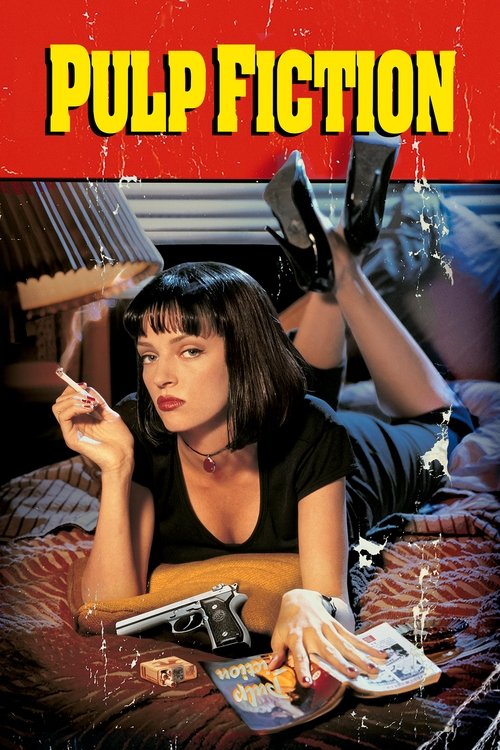
Title: Pulp Fiction
Year: 1994
Director: Quentin Tarantino
Writer: Quentin Tarantino
Cast: John Travolta (Vincent Vega),
Samuel L. Jackson (Jules Winnfield),
Uma Thurman (Mia Wallace),
Bruce Willis (Butch Coolidge),
Ving Rhames (Marsellus Wallace),
Runtime: 154 min.
Synopsis: A burger-loving hit man, his philosophical partner, a drug-addled gangster's moll and a washed-up boxer converge in this sprawling, comedic crime caper. Their adventures unfurl in three stories that ingeniously trip back and forth in time.
Rating: 8.489/10
"Just because you are a character doesn’t mean you have character." This meta-commentary hints at the cool, quirky, and morally ambiguous world of "Pulp Fiction."
/10
Posted on May 29, 2025
Quentin Tarantino’s Pulp Fiction isn’t just a film; it’s a cinematic earthquake that shattered conventional storytelling and redefined cool for a generation. With its non-linear narrative, sharp and witty dialogue, memorable characters, and a soundtrack that grooves from start to finish, it’s a postmodern masterpiece that continues to captivate and influence filmmakers and audiences alike.
The cinematography, largely by Andrzej Seku?a, is as stylish and distinctive as the film itself. Tarantino’s signature shots, from trunk POVs to lingering close-ups, create a unique visual rhythm. The color palette is vibrant and saturated, reflecting the film’s energetic and often surreal tone. The camera work is dynamic, moving fluidly through the various interconnected storylines and highlighting the film’s playful and self-aware nature.
The acting performances are iconic. John Travolta’s resurgence as Vincent Vega is a masterclass in cool detachment, punctuated by moments of unexpected vulnerability and killer dance moves. Samuel L. Jackson delivers a career-defining performance as Jules Winnfield, the philosophical hitman whose Bible quotes and sudden bursts of violence are both hilarious and terrifying. Uma Thurman’s Mia Wallace is the epitome of enigmatic cool, her dance scene with Travolta instantly entering cinematic history. The supporting cast, filled with memorable characters like Bruce Willis’ Butch Coolidge, Harvey Keitel’s Winston The Wolf, and Tim Roth and Amanda Plummer’s Honey Bunny and Pumpkin, all contribute to the film’s rich tapestry of quirky personalities.
The setting of Los Angeles, with its diners, apartments, and seedy underworld locations, becomes a character in itself. Tarantino imbues these seemingly mundane environments with a sense of heightened reality and cool detachment. The costumes, from Vincent and Jules’ sharp suits to Mia’s chic style and Butch’s tough-guy leather jacket, are all integral to the characters’ instantly recognizable personas.
The film score, a curated collection of surf rock, soul, and funk tracks, is as essential to the Pulp Fiction experience as the dialogue itself. The soundtrack doesn’t just accompany the action; it defines its mood and rhythm, creating an infectious and undeniably cool atmosphere.
The screenplay, written by Tarantino and Roger Avary, is a triumph of witty and stylized dialogue. The conversations, often seemingly mundane, are filled with pop culture references, philosophical musings, and a unique Tarantinoesque rhythm. The non-linear narrative, jumping between interconnected storylines, keeps the audience engaged and constantly re-evaluating events. The film’s self-aware humor and its playful deconstruction of genre conventions are hallmarks of Tarantino’s filmmaking style.
Pulp Fiction is more than just a crime film; it’s a cultural phenomenon. Its innovative storytelling, unforgettable characters, killer soundtrack, and endlessly quotable dialogue have cemented its place as a cinematic landmark. It’s a film that is both coolly detached and deeply engaging, a wild ride through the underbelly of Los Angeles with a style all its own.
0
0
